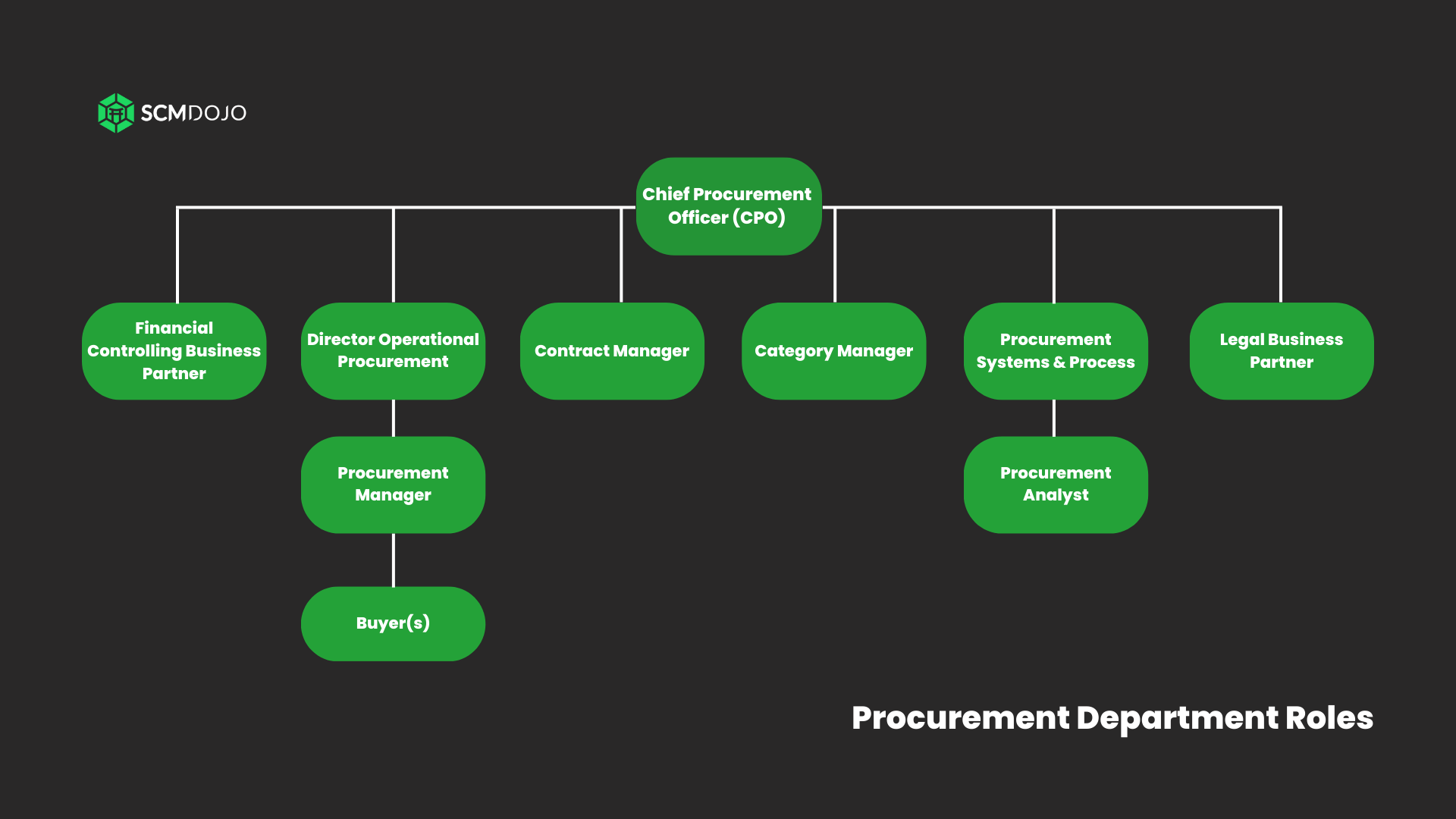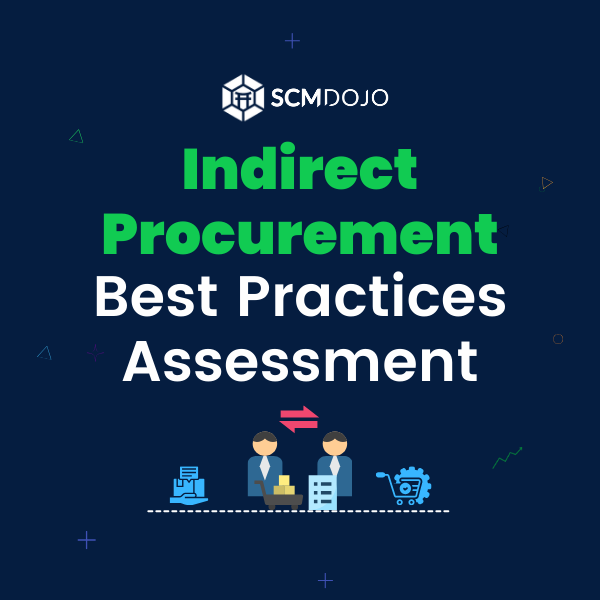The procurement department is an integral part of any organization, playing a crucial role in the purchasing process. This department manages the selection, acquisition, and payment of goods and services needed to run a business. To get the most out of any procurement team, all the associated vital roles need to be filled with qualified individuals that understand both technology and the principles of supply chain management.
In this blog, we will be breaking down these roles and responsibilities for you and highlighting the importance of this very underrated organizational department.
[Read More: Top 16 Procurement KPIs – The Ultimate Guide]
Key Takeaways
- The procurement department is critical to an organization, obtaining quality goods and services at competitive prices while ensuring the organization’s resources are needed to succeed.
- The procurement department encompasses all steps in acquiring goods, services, and works from external suppliers and performs various functions such as managing the procurement process, developing strong relationships with internal stakeholders, and negotiating contracts.
- The procurement department comprises vital roles such as the Chief Procurement Officer, Director of Procurement, Procurement Manager, and Procurement Analyst, who work together to ensure the procurement process is regulated and aligned with organizational goals.
- Estimated Salary for each role.
The Purpose of the Procurement Department
The procurement department adds value to an organization by obtaining quality goods and services at competitive prices. This requires a deep understanding of the supplier’s market and an ability to negotiate favourable prices through volume orders or payment terms. It also involves staying informed about company expenses and credit card usage policies. A strong procurement department not only secures the best deals but also cultivates lasting relationships with suppliers, maintains open communication about changes in material needs, and plans for seasonal demands. Procurement aims to ensure that the organization gets the resources it needs to succeed at a cost that maximizes value and minimizes risk.
Purchasing vs Procurement
Regarding the procurement department, it’s essential to understand the difference between purchasing and procurement. Purchasing refers specifically to negotiating and purchasing goods or services from a vendor. Procurement, on the other hand, encompasses all the steps involved in acquiring goods, services, and works from external suppliers. This includes identifying needs, setting terms, selecting vendors, negotiating and purchasing, delivering, and even post-purchase assessment. In a nutshell, procurement is all about making sure the organization gets the right product or service, at the right price, in the most efficient way possible. Therefore, understanding the difference between the Procurement and Purchasing and the work they do is vital to understanding the comprehensive role of their work in any organization.
[Read More: Purchasing vs Procurement – Difference Simplified]
Functions of the Procurement Department
The procurement department is a critical component of any organization, performing various functions that support its operations and goals. These functions include:
- Managing the procurement process and supply base: The procurement team oversees the entire procurement process and ensures that all requisitions and requests are met. They also work with the organization’s supply base to ensure coordination and efficiency.
- Developing strong relationships with internal stakeholders: The procurement department works closely with other departments within the organization to build strong relationships and provide information and support, satisfying the needs of the internal stakeholders (the staff).
- Supporting the organization’s goals through effective strategies: The procurement team supports the organization by monitoring supply markets and trends, identifying critical materials, and developing effective procurement strategies to increase competitiveness.
- Strategic sourcing: Procurement performs a market analysis to identify potential sources of supply and support the organization’s needs.
- Risk mitigation: The department works to identify and mitigate risks to ensure success.
- Supplier relationship management: Procurement manages relationships with suppliers to ensure coordination and effective workflow.
- Contract development: The team develops and establishes contracts with supplier organizations to meet the buyer organization’s requirements and needs.
- Category management: The team undertakes the task of categorizing items for efficiency and effectiveness, leveraging spend.
- Negotiation: The procurement department negotiates on behalf of the organization to ensure mutually beneficial outcomes that meet the organization’s requirements.
By performing these functions, the procurement department work plays a crucial role in ensuring the organization has the resources it needs to succeed.
Introduction to Procurement: An Online Course
Key Roles of the Procurement Department Structure Defined
After going over the purpose of the procurement department, the difference between purchasing and procurement, and the functions of the department, we will now discuss some of the key roles and their job descriptions that need to be filled out by competent individuals who possess the necessary skills, knowledge and expertise.
The following is what a Procurement Department structure would look like in an organization. This is an atypical example and maybe not be the exact representation of your business, but you can get some reference points from this.
1. Chief Procurement Officer (CPO) – the Head of the Procurement Directorate or Unit
- Leads the procurement team, manages the procurement process and oversees all procurement activities, ensuring they are appropriately regulated and in line with set rules, regulations and policies. They also manage all employees within the department.
- The Chief Head of Procurement is responsible for developing procurement policies and procedures for the organization. They create procurement guidelines to guide Procurement activities and ensure alignment with organizational objectives.
- Negotiates cost-effective contracts with suppliers while following organizational policies and guidelines.
- Ensuring procurement activities align with the organizational budget and are strictly adhered to.
Salary Range: The estimated pay for a Chief Procurement Officer is $150,000 – $214,359 per year in the United States, with an average salary of $142,429 per year.
2. Director of Procurement
- This position may vary from organization to organization depending on the structure and system of the company.
- The main point of contact for procurement-related matters and heads the procurement department, ensuring all procurement work is done and accomplished and that all Procurement Department objectives are met.
- Responsible for maintaining market knowledge to ensure the best value and practices in procurement activities, to support the procurement goals and objectives of the organization.
- Leading procurement negotiations and agreeing to service levels and contracts with suppliers.
- Research other options to source the best value products and services. The director of procurement leads the research and sourcing for the organization’s best-value products and services.
Salary Range: The base salary for the Director of Procurement ranges from $154,000 to $190,700, with an average base salary of $171,600.
3. Procurement Manager
- The head of the department oversees all procurement activities and processing.
- Meets with supervisors and department heads to understand the needs across the company to ensure a smooth procurement process.
- Works with procurement staff to forecast organizational needs and supplies using past data.
- Review requests for proposals (RFPs). The Manager reviews RFPs before sending them out to potential suppliers to bid.
- Review and negotiate procurement contracts within the organization to ensure the best value.
Salary Range: The base salary for a Procurement Manager ranges from $109,800 to $140,200, with the average base salary of $123,700.
4. Procurement Analyst
- Determine the supply needs of the organization, helping in researching potential suppliers for products and service providers based on requirements or needs.
- Researching and documenting features and benefits of products and services for strategic decisions concerning procurement. This helps the organization derive the best value from products and services.
- Preparing procurement cost-benefit analysis helps managers and directors make sourcing decisions on products. For example, preparing the total cost of ownership documents helps the organization know the total cost of acquiring products before purchasing.
- Documenting processes and generating monthly supply cost reports helps in strategic procurement decisions.
Salary Range: The salaries of Procurement Analysts in the US range from $26,110 to $125,000, with a median salary of $56,820.
5. Contract Manager
- A contract manager within an organization ensures the management of the entire contract process.
- Ensuring the organization’s internal contract documents are accurate and well-maintained for all procurement transactions.
- Providing advice and legal guidance to the different teams concerning procurement contract issues and contract generation.
- Maintaining excellent working relationships with clients to ensure their needs are met, ensuring contract terms between both parties are adhered to per the contract terms and conditions.
- Creating, preparing, reviewing, and managing all contracts related to procurement within the organization.
Salary Range: The salaries of Contract Manager in the US range from $76,110 to $105,065, with a median salary of $80,432 per year.
6. Category Manager
- Analyzing data which helps create the categories of procurement for easy management.
- Devising long-term development strategies for product categories, ensuring long-term plans exist using market knowledge and data while ensuring best practices are followed.
- Developing exit strategies for unsuccessful products. Not all categorization of products may work; the category manager must develop an exit plan for failed categories.
- Fostering trust relationships with vendors to achieve better pricing and quality of services, ensuring relationships are well coordinated and managed for the best value of products and services.
- Placing appropriate orders to ensure product availability that meets consumer demands.
Salary Range: The salaries of Category Manager in the US range from $86,110 to $113,925, with a median salary of $85,163 per year.
7. Buyer
- Assisting with Materials Requirement Planning, purchasing and ensuring that correct materials are purchased within budgeted costs and on time, taking appropriate stock levels (stock turns) into account.
- Processing purchase orders using the preferred organizational methodology, ensuring orders are loaded accurately and at standard cost and all relevant data is kept up to date.
- Preparing reports of procurement-related activities, reporting on all procurement transactions and activities within a specific time period for the procurement manager to review and subsequently submit to management actions.
- Assisting with materials costs, working to achieve competitive quotations from different sources while operating within the current purchasing framework.
Salary Range: The average Buyer salary in the United States is $72,843 as of, but the salary range typically falls between $65,513 and $80,986.
8. Financial Control Business Partner
- Responsible for reviewing the commercial performance of the procurement department.
- Supporting business planning by providing financial analysis and modelling.
- They are identifying and measuring key success drivers.
- They are providing finance and business support to commercial, sales, and operational staff.
- Supporting decision-making with data and insight.
9. Legal Business Partner
- Advising on legal risk and opportunities (from strategic to day-to-day) in line with the organization’s objectives to the procurement department.
- They provide end-to-end legal advice.
- Drafting and negotiating fit-for-purpose contracts, including agreements with producers, broadcasters, talent, marketing & PR agencies, venues, IT, and other suppliers.
- Legal lead on strategic projects.
Procurement, Purchasing and Supply Chain Success.
In conclusion, the procurement department is critical in ensuring any organization’s smooth functioning and success. From managing procurement processes to maintaining relationships with suppliers to developing procurement policies and procedures, the procurement department and its staff are key in ensuring that the organization can meet its goals and objectives effectively and efficiently. Furthermore, organizations can better leverage this critical function to support their long-term success by understanding the various procurement department roles and responsibilities.
Subscribe to our YouTube Channel for more jam-packed information related to procurement and all things supply chain!
About the Author- Dr Muddassir Ahmed
Dr MuddassirAhmed is the Founder & CEO of SCMDOJO. He is a global speaker, vlogger and supply chain industry expert with 17 years of experience in the Manufacturing Industry in the UK, Europe, the Middle East and South East Asia in various Supply Chain leadership roles. Dr. Muddassir has received a PhD in Management Science from Lancaster University Management School. Muddassir is a Six Sigma black belt and founded the leading supply chain platform SCMDOJO to enable supply chain professionals and teams to thrive by providing best-in-class knowledge content, tools and access to experts.
You can follow him on LinkedIn, Facebook, Twitter or Instagram







